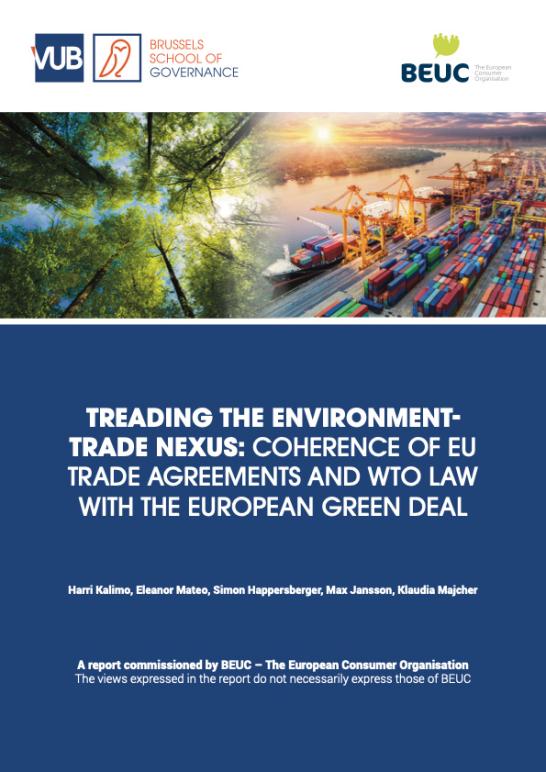This Report analyses the coherence between the European Union’s trade policy and the European Green Deal (EGD).
The European Union (EU) is faced with two fundamental developments. On the one hand, the impacts of consumption and production globally are exceeding the environmental carrying capacities of our planet on multiple fronts from climate change to biodiversity loss. On the other hand, the current paradigm of a global economy that increases economic prosperity through an open, liberal trading system is under pressure. International trade flows are increasingly intertwined with geopolitical tensions that are reflected in the partial paralysis of the World Trade Organisation (the WTO) and an increase in unilateral measures and outright protectionist policies.
The developments on the environment and trade are closely interconnected. Global value chains underpin a significant share of the environmental and social impacts that Western consumer societies cause. Addressing environmental concerns outside the EU’s borders driven by EU consumption adds fuel to these tensions. The objective of this Report is to analyse the coherence of EU polices at the nexus between environment and trade. The Report was commissioned by BEUC - the European Consumer Organisation to assess specifically the coherence of the EU’s bilateral trade agreements and key WTO Agreements with the European Green Deal (EGD), while excluding the reverse direction of the EGD’s coherence with trade policy.
The EGD aims at addressing environmental problems, transforming the EU into a society that is prosperous, sustainable, inclusive, and climate neutral by 2050. The EGD requires all EU policy areas to contribute to its objectives. EU trade policy is one of the fields that implements the EGD externally. Environmental sustainability has indeed been acknowledged to different degrees in the EU’s bilateral and multilateral trade instruments. The EU’s 2021 trade policy review ‘Open, Sustainable and Assertive Trade Policy’ incorporates environmental sustainability as a key objective. Sustainable development is a central principle underlying the WTO agreements. But to what extent are the EU’s trade instruments and the WTO law coherent with the EGD upon closer look? Coherent laws and policies positively support one another to realize a set of common principles or rationale.
The EGD covers a very wide range of policies. This Report focuses on three key environmental objectives advanced by the EGD as case studies: (1) Sustainable use of natural resources: reducing the environmental impacts of batteries through recycled-content requirements in the EU eco-design policy; (2) Public health: combatting resistance to antimicrobials in EU food policy; (3) Animal welfare: protecting the treatment of animals in EU food policy. The cases were selected using the following criteria: the relevance of the issue area for the EU consumers; the existence of recent or upcoming EGD-based legislation on the topic; a close link to EU trade agreements; and relevance from the viewpoint of WTO dispute settlement. The Report also excluded policy measures such as the EU’s Carbon Border Adjustment Mechanism (CBAM) or the Deforestation Regulation, which are already researched extensively.




